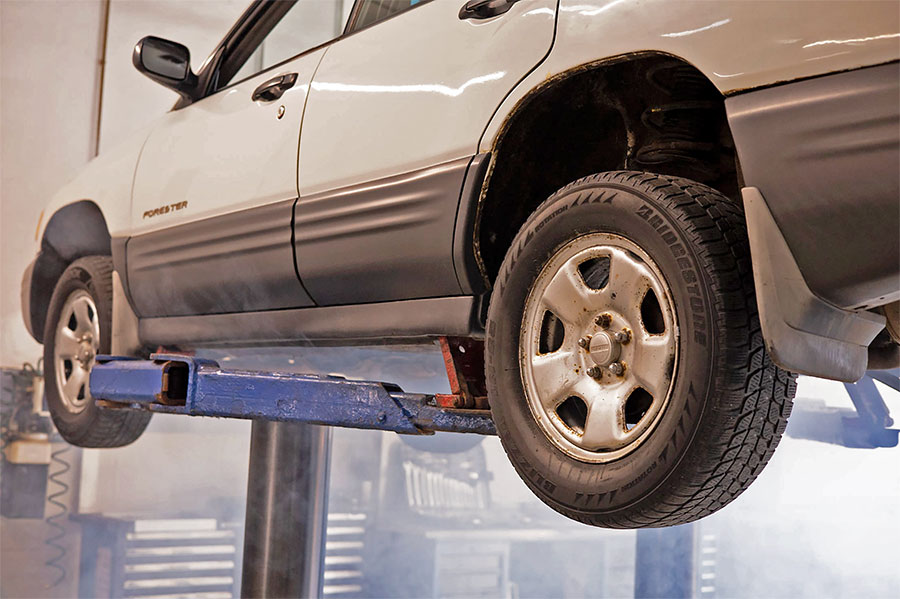WELLINGTON COUNTY – Winter driving in Canada is hard on vehicles. Ice, salt, potholes, grocery carts – there’s no shortage of reasons to give your car some much-needed TLC this spring. But maintenance can be expensive, so it’s helpful to understand what needs attention now, and what can wait.
Wash, Wax and Wipe
It happens every year. The temperature warms, snow melts, and vehicles are covered in a familiar greyish layer of salt, grime and dirt.
A thorough wash and wax is a good idea. Whether it means dragging out the hose or heading to the nearest car wash, a good cleaning will remove any buildup and protect the paint from damage that won’t spray off.
Vehicles should be cleaned in a shaded area to prevent water spots and dried thoroughly to avoid rust.
It’s also a good time to test the wipers. If they leave streaks or make noise, it’s likely time to replace them. April showers are a welcomed part of spring, but being able to see the road during a storm is paramount.
Check the tires
Safe driving starts with safe tires. It’s important to monitor your tire pressure and make sure the tires are properly inflated. Car owners often don’t realize the shift in temperature from winter to spring can cause air molecules inside a tire to expand and contract, resulting in a loss of air pressure.
Most newer vehicles have a tire pressure monitoring system (TPMS) indicator, but they’re not always installed on winter tires. If you’re unsure, play it safe and don’t wait for the light to come on.
When it comes to the life of tires, tread depth is important. A tread depth gauge should be used to determine how much life is in a set of tires. Easier said than done right? Actually no. It’s a very simple step that any certified technician should be able to do in only a few minutes. If they’re charging to do it, perhaps consider another shop.
Buy the tires – or not:
There are a lot of factors that determine whether or not it’s time to replace your tires. Find a trustworthy mechanic and get an assessment.
Don’t subscribe to the idea that your tires are x number of years old and therefore it’s time to replace them. It could be that you did less driving last season than usual, or that the tires simply need to be rotated. Don’t be afraid to ask questions and pay attention to what kinds of questions a mechanic might have.
Driving habits are an important consideration when deciding which type of tires to buy and when.
Re-torque
Whether buying new tires or having tire work done, it’s important to return for a re-torque. Not having your wheels re-torqued is like running a marathon without stretching. It’s preventative. The repercussions of not having it done when needed are much more severe than a cramp and a bruised ego.
Every year in Ontario there are stories of wheel separations on highways. While rare, they can be extremely dangerous and in some cases, fatal.
When it comes to vehicle safety, nothing should be left to chance. Most reputable auto shops will do a re-torque free of charge in under five minutes. This could also be a good time to get that tread depth measured.
Inspect the brakes
Brakes are critical to safe driving. Worn pads, rotors, and calipers can cause serious problems on the road. Squealing or grinding sounds when applying the brakes, or the vehicle pulling from side to side are signs they need to be replaced.
The anti-lock brake system (ABS) also gets a lot of use in the winter so it’s advisable to have your brakes looked at seasonally.
Change the oil
Whether it’s that looming sticker in the corner of the windshield or a light on the dash, don’t ignore oil changes. Oil is the lifeblood of your vehicle and regular oil changes are essential for the longevity of your engine. Over time, oil gets dirty and loses its ability to lubricate the engine properly. A spring oil change will help keep your vehicle running smoothly and efficiently.
Check the battery
It’s easy to go unnoticed, but often during the coldest months of the year, engines can take an extra second or so to get started. The cold months are also hard on your starter and alternator. Having your battery checked in the spring is a surefire way to prevent it failing when you need it most.
If it’s more than four to five years old, it could be time to have it replaced.
Owning a vehicle can be like having a pet – they are often needy and expensive, but they have a lot to offer.
Regular maintenance saves money in the long-run, but more importantly it keeps you and your passengers safe. While there are other issues to watch out for, following these steps will set you on the right track to road safety.




